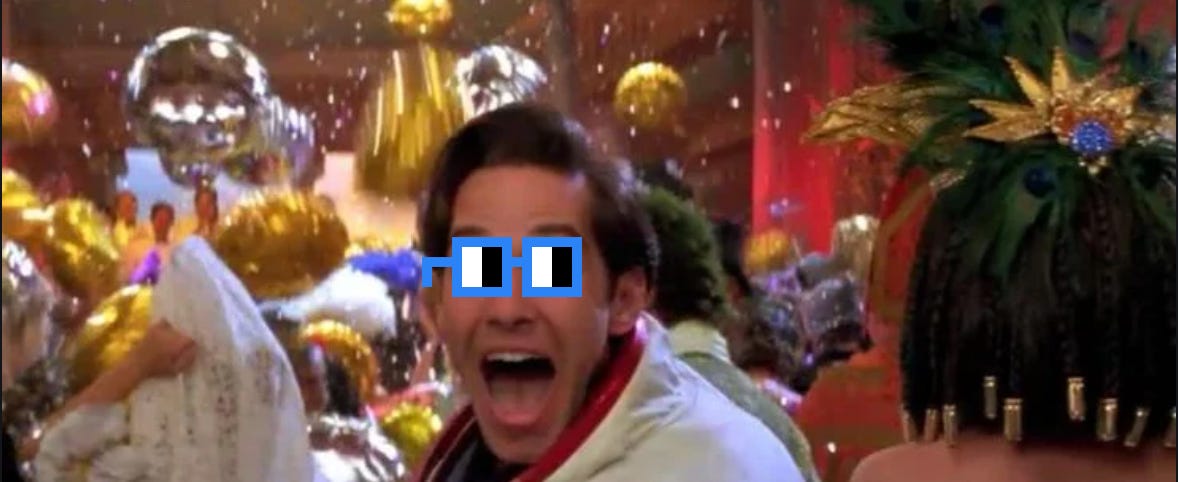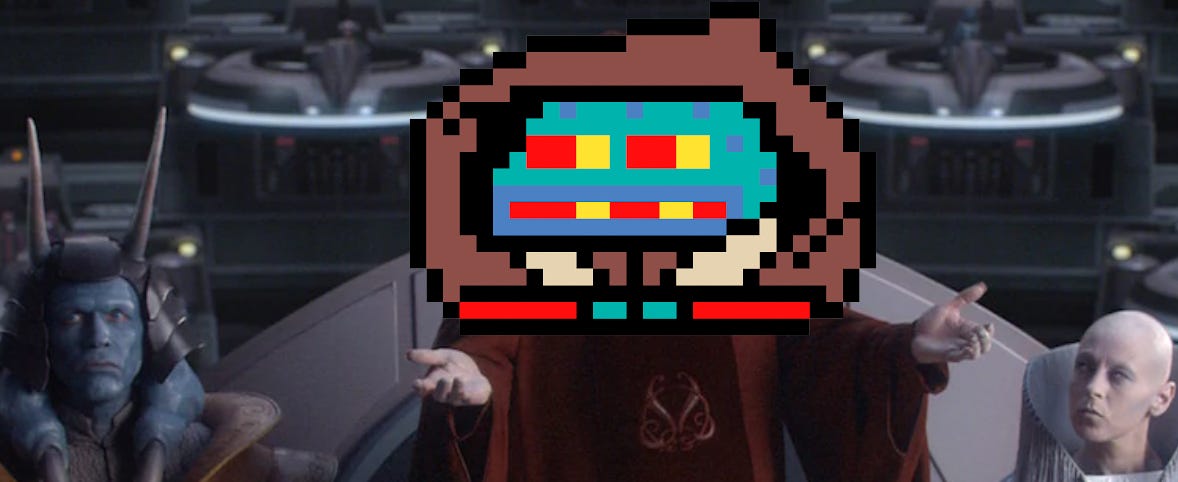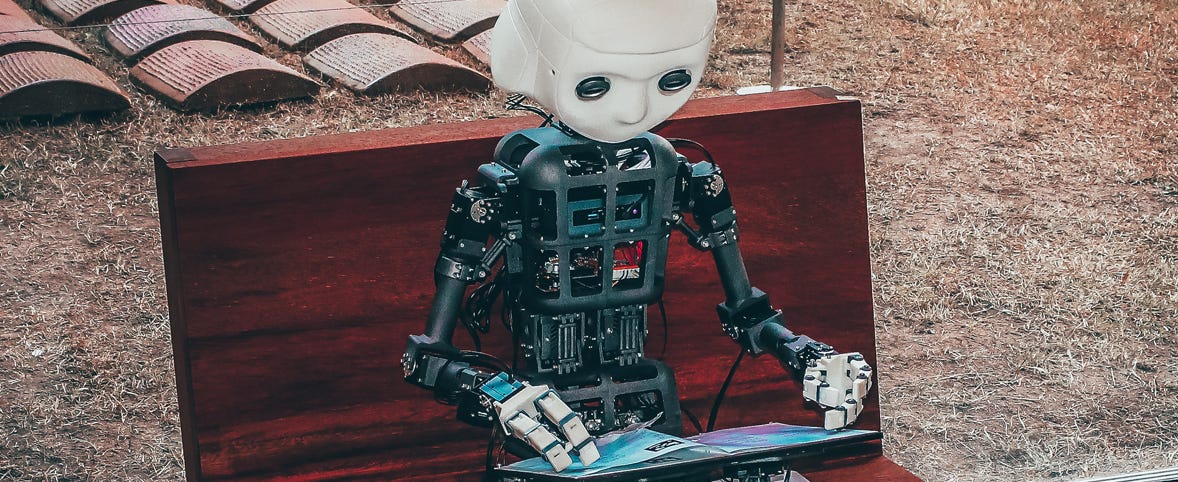CCoh? 🎞️
Issue 0x3…Welcome to the Ice Ice Derivative stage of Creative Commons Zero.
See those little glasses used to break up opening thoughts in this newsletter? Those unicode spectacles are the symbol of Web 3, created by someone who was building off of innards of NounsDAO, where the glasses originated. If you want to think bigger, they are the new Nike swoosh, a symbol that projects a certain ethos, if everyone in the world was allowed to embrace and extend the Nike swoosh without receiving a cease and desist from the sneaker giant.
⌐◨-◨
If this is the case why in most NFT Discords when you ask if the project is CC0 do you get either no response, or a quick “What is CC0 bro?”. Seems most people don’t know what CC0 or why it matters. For that matter, we are still not exactly sure what CC0 is or what the results will be in the years to come. Much like how the symbiote produced a different result inside of Peter Parker and Venom, CC0 does the same for the different projects that come after the primitive.
⌐◨-◨
We can look to the past for clues. Romeo & Juliet, the Happy Birthday song, and the Smiley Face (in the US only oddly enough), are all in the public domain (no rights reserved, just like CC0), meaning anyone can use, build, and profit from these works without permission (ex: Romeo and Juliet pulled in $67.6 MM for 20th Century Fox in 1996, mostly because Paul Rudd was in it).
⌐◨-◨
CC0 also already dominates code, just ask Facebook. A $600B company (valuation is falling by the minute!) that was originally built mostly on open source, copyright free LAMP tech stack (Linux, Apache, MySQL, PHP) and these days is probably an amalgamation of open source and custom code that is impossible to untangle.
⌐◨-◨
Point is, both tech and culture creators have a history of making something new and exciting on top of CC0, and the same will be true for Web 3.
🐸 Memability
What matters in Web 3?
Thus far attention and velocity are right at the top of the list. When the NounsDAO came together in the summer of 2021 the original builders went to extremes to try and create memable digital assets. The project is incredibly ambitious and currently has over 20k Ξ (~$60MM) in their treasury, all coming from their daily auction of Nouns — these pixelated characters that serve as your credentials for a seat at the table, to govern alongside other Nouns. Basically, it is like this scene from Phantom Menace — hopefully 4156 doesn’t turn out to be Chancellor Palpatine.
Each one of these Noun NFTs have these ⌐◨-◨ on them.
If you spent any time inside the Nouns Discord in the last six months you would have noticed many in the group seemed laser focused on meme acceleration and distribution. This memetic strategy reached new heights during this years Super Bowl when Budweiser, who weeks prior had purchased a beer headed Noun, placed the ⌐◨-◨ inside one of their ads. It was an easter egg sure, most people probably didn’t notice or care, but it is an example of even the biggest of brands utilizing the Noun meme & brand to reach the biggest of audiences (Super Bowl watchers) — this feels like a clear sign of what’s to come.
⛓️ Check The Chain
In an age where deep fakes are quickly becoming difficult to detect, and GAN is being trained to recreate new Picasso’s on the spot, it appears more and more likely that we will be “checking the chain” to ascertain the authenticity of many things in the not too distant future.
Yes, this means that signed hash of the token you purchased is more than likely going to be a store of value. Whether it stores the deed to the house you live in or a URL to the latest digital art you purchased, we will all no doubt be relying on this mechanism as a source of truth.
What does that mean for CC0? Well, if you can imagine a world where undistinguishable derivatives are almost instantaneously produced and distributed, it isn’t hard to see that the next step is assigning value to the originals.
We saw glimmers of this last fall with Cryptoadz, when after the meme ready toads mooned on OpenSea many complete copy pasta collections showed up ready to cash in. Even worse, some of the many low effort derivatives that sprung up ended up being rug pulls, which reflects horribly on the originals. Nouns, has also gone through a similar cycle to some extent. Point is, once you go CC0 you loose all control. The narrative is turned over to those who build on top of the primitive, for better or worse.
The most interesting part of all this is that the market has not assigned much, or any value to these low effort derivatives thus far, and virtually zero value to any straight up copies of popular CC0 projects.
We are all still sifting our way through the perils and advantages of digital ownership, specifically CC0 ownership, and while it is safe to say there hasn’t been a Romeo and Juliet moment for CC0 yet, it is clear that provenance will only get more important in the future and checking the chain will be a new behavior most of us engage in to verify not only ownership, but creatorship as well.
🐭+💻 Culture API
It is still hard to articulate why CC0 seems so important now, but it feels like what is next as media, tech, culture mix all over again.
CC0 projects are potentially transformative, but since they aren’t skeuomorphic (thanks Chris Dixon!) it leaves most of us scratching our heads, until that obvious aha! moment hits.
For us, the best analogy we have at the moment is CC0 projects like Nouns are building a Cultural API. These creations send a signal and project an ethos that travels as far as their meme distribution will carry them.
Many future creators will come along and create something that non of us have even thought about yet that extends that ethos even further into their culture — in much the same way that back in the day you could build off the Google Maps API, or the Twitter API and create new applications that people loved.
What will those creations be ¯\_(ツ)_/¯ , but we will all know ‘em when we see ‘em, and NounsDAO may end up funding some of them themselves.
⏲ Back in the 90s…
In the 90s there were two famous yodelers. Jewel and Wylie Gustafson.
When Yahoo was a scrappy startup with a bit of VC cash for marketing they hired Wylie, who created the signature Ya-hooooooooo! Everyone knows and loves.
Thing is, years later, when Wylie heard his yodel in a Super Bowl commercial and Yahoo was worth tens of billions, he felt the deal had been altered. Wylie claimed he sold his yodel for a regional commercial, Yahoo claimed they bought the yodel to use however they wanted.
Lawyers got involved and in the early aughts Wylie walked away with a multi-million dollar check for his signature yodel, which he admits took him about 10 minutes to create.
🎵 Music To Set The Mood
CC0 is currently in the Ice Ice Derivative stage.
Ours goes “ding ding ding ditty ding ding tch”





